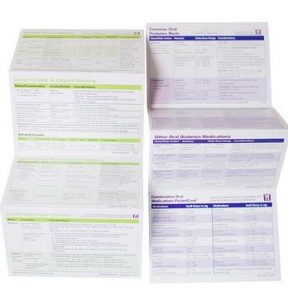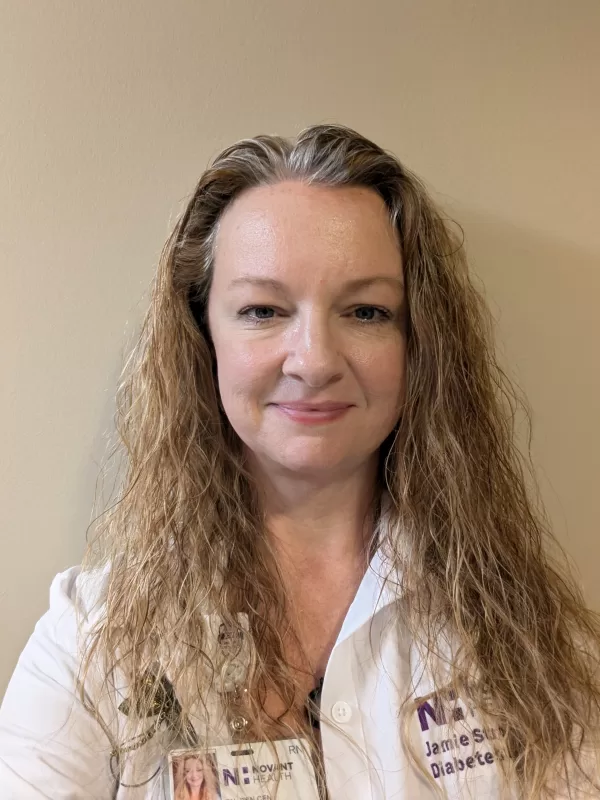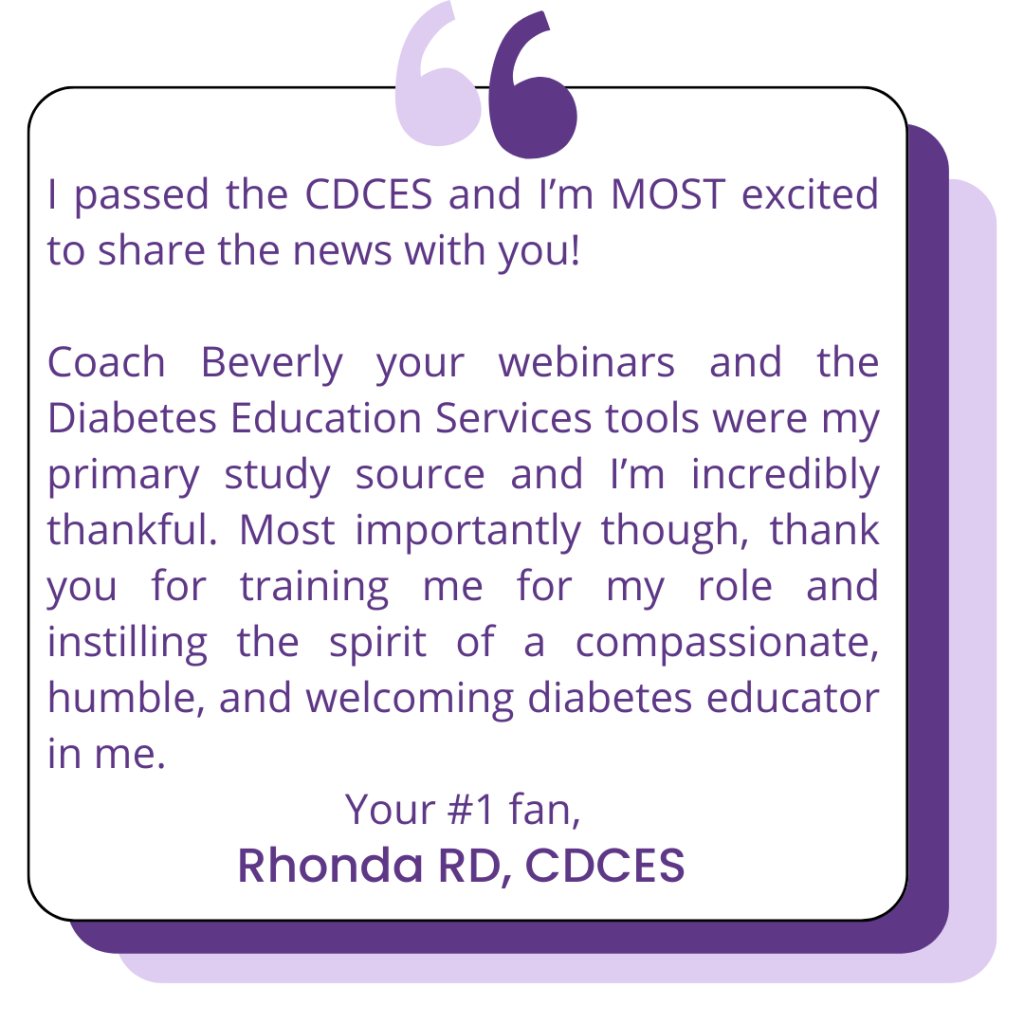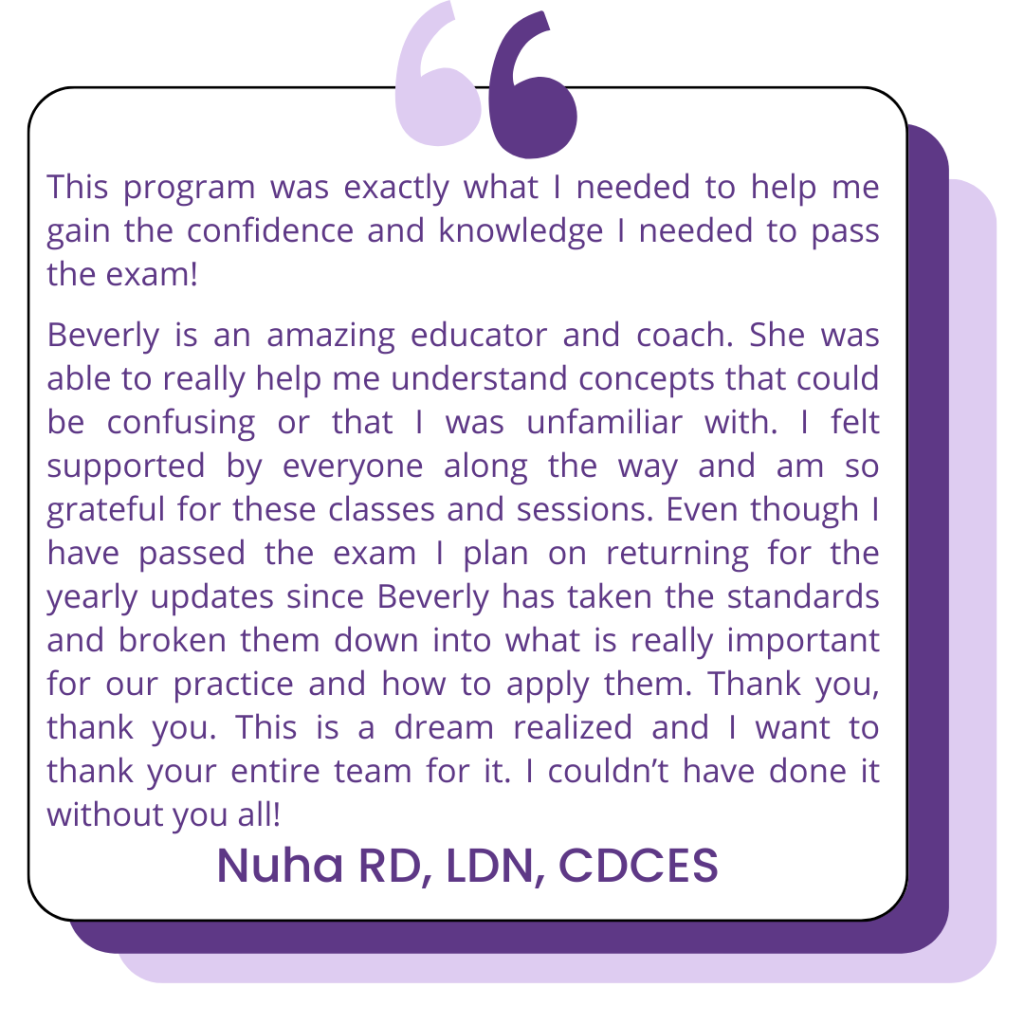
Subscribe
eNewsletter

Ready to get certified?
Free CDCES Coach App
Download
Free Med Pocket Cards

eNewsletter

Free CDCES Coach App
Free Med Pocket Cards
Coach Beverly and the Diabetes Education Services team have custom-designed this detailed roadmap to CDCES and BC-ADM certification exam success!
Step 1: Find Out
To apply for the CDCES or BC-ADM Exam, you must meet the eligibility requirements.
You can use these images as a reference, or click the direct link to learn more here!
We offer complimentary webinars that help you learn more about both the CDCES and BC-ADM exam pathways.
Join us live or listen to our On-Demand version by registering today! Learn how to focus your time and prepare to take the certification Exam. We provide plenty of sample test questions and test-taking tips!
Step 2: Download Coach App
Download our free CDCES Coach App. Our app provides you with easy access to our Medication PocketCards, Online University login, Free Webinars, Question of the Week, Knowledge Bytes, and much more!
When you download the CDCES Coach App you have immediate access to the most up-to-date information:
You can download it from the App Store or Google Play!
Step 3: Self-Assess
To determine how to best spend your study time, we encourage you to first assess your Diabetes Knowledge. By using the tools below, you can determine what your best course of action is for certification exam success. We are here to help you create the perfect study plan!
We suggest rating your knowledge for the exam outlines below in each of the key areas on a scale of 1-5. One means you are not very familiar with the content and five means you are a pro. Areas with 1-3 ratings deserve the majority of your study time. Areas rated 4-5 warrant less review and study time. Next, map out a timeline that includes the best times to study, and topic areas to review, and start gathering your study resources.
The CDCES Exam includes content on providing education and self-management training to people with diabetes across their lifetime; this includes kids, adults, pregnancy, and older adults. It also includes questions on acute illness, hospitalization, and insulin pump therapy. The largest test section includes intervention questions. This area focuses on medications, insulin and pattern management, nutrition therapy, and exercise.
175 Multiple Choice Questions (150 scored/25 pre-test) broken into the following domains:
Domain 1: Assessment of the Diabetes Continuum (37)
Domain 2: Care & Education Interventions (105)
Domain 3: Standards & Practices (8)
These self-assessment pages will help you identify knowledge gaps and reaffirm content you are familiar with.
175 Multiple Choice Questions broken into the following domains:
Domain 1: Assessment and Diagnosis (45)
Domain 2: Planning and Intervention (50)
Domain 3: Evaluation and Follow-Up (34)
Domain 4: Leadership and Advanced Professional Practice (21)
To prepare for success, get in your best shape by exercising your test taking muscles. Take as many tests as possible to increase your comfort, confidence and exam readiness.
Watch the Test Taking Success Webinar recording, designed specifically for busy healthcare professionals preparing for diabetes certification.
During this webinar, you will have the opportunity to answer and dissect 20 sample exam questions alongside Coach Bev. Learn how to avoid common exam pitfalls and get to the best answer!
This content will boost your confidence and clarity so you can walk into exam day feeling prepared, calm, and in control. Coach Beverly has helped thousands of candidates cross over the finish line to success. She has passed her CDCES exam 7 times and counting.
🎯 Gain Confidence with Proven Strategies —save your spot today.
Step 4: Build Study Plan
Once you have identified areas where you want to focus your study time, it's time to determine how to best fill in the knowledge gaps you identified when you did your self-assessment using the exam outlines. Depending on your learning style there are different options to fill in identified knowledge gaps and increase your depth of diabetes knowledge.
Both certification exams include content on the Standards of Care, pharmacology, behavior change, Medical Nutrition Therapy, psychosocial issues, CVD and CKD risk mitigation, technologies, and diabetes care through the lifespan.
Step 5: Review
In preparation for exam success, it is important to be familiar with the National Standards of Care and Position Statements published by the American Diabetes Association (ADA), the American Association of Clinical Endocrinology (AACE), and the Association of Diabetes Care & Education Specialists (ADCES).
These Standards and National Guidelines are important not only for the exam but for your own clinical practice. As diabetes specialists, providing evidence-based care that is up-to-date and accurate translates into the best care.
Know the National Goals for the exam. Keep in mind that your particular clinic goals may not match the national goals. So, leave your clinic goals behind when you are taking the exam.
Based on student feedback and the exam outline, here are the top five articles to start reviewing:
Step 6: Learn Meds & Insulin Therapies
An important part of being a successful Diabetes Educator is gaining a thorough understanding of diabetes medications and insulin therapy.
On the exam, they list the generic and trade names for the medications. Make sure you know what class the medication belongs to, precautions, side effects, and important patient teaching points.
A helpful strategy is to be very familiar with the content outlined in our Medication and Insulin PocketCards.
You can now purchase all four of our medication PocketCards in a new laminated accordion-style format or download for free now. The perfect study partner!
We also offer many online courses that review the critical content for medications that will help increase your confidence and knowledge for the exam and your clinical setting.

Our diabetes cheat sheet page is brimming full of useful information for your clinical practice and exam success. Updated annually by Coach Beverly to reflect the latest ADA Standards, we invite you to take a look around and enjoy these helpful resources.
The exam also includes questions about common medications to treat hypertension and lipids. Make sure to have a general knowledge of the main classes, side effects precautions, and patient education content. Here are the best resources to build your medication knowledge:
Print these "cheat sheets" as part of your studies, plus they are great resources to have available in your practice setting.
Step 7: Understand Diabetes Care Philosophy
When entering the field of Diabetes Education, it is important to be familiar with the philosophy behind how-to approach diabetes self-management education. Read the following to gain insights into the philosophical underpinnings included in the certification exams.
When entering the field of Diabetes Education, it is important to be familiar with the philosophy behind how-to approach diabetes self-management education. Read the following to gain insights into the philosophical underpinnings included in the certification exams.
As educators, advocates, spouses, friends, and providers, our use of language can deeply affect the self-view of people living with diabetes every day. Watch our free webinar What We Say Matters FREE Webinar to learn more.
A must-read for anyone entering the field of Diabetes or as a reference for those already in the field. These 7 Self-Care Behaviors™ provide a framework for patient-centered diabetes self-management education and training (DSME/T) and care.
Step 8: Complete Experience Requirement
After meeting the discipline requirement, applicants must meet the experience requirement for the certification exam.
Click the drop-down menu(s) below to learn more about CDCES and/or BC-ADM Exam Hour Requirements!
What counts as “Diabetes Care & Education” hours?
From page 4 of the 2026 Certification Examination for Diabetes Educators Handbook, here is an explanation of what counts towards the 1000 hours requirement:
What counts as “Advanced Clinical Practice” hours?
From pages 11 & 12 of the BC-ADM Handbook, here is an explanation of what counts towards the 500 advanced clinical hours requirement:
Managing complex patient needs
Monitoring, interpreting, and applying results generated from complex patient data sets
Formulating and prioritizing a problem list
Educating individuals about medical nutrition therapy
Incorporating technologies into practice for the maintenance and/or management of diabetes and cardiometabolic conditions
Managing and adapting interventions for special populations
Assisting patients with therapeutic problem-solving
Adjusting medications if within their discipline’s scope of practice
Treating and monitoring acute and chronic complications and other comorbidities
Addressing psychosocial issues
Participating in research
Mentoring other clinicians in diabetes care
Step 9: Prepare
Set yourself up for success. Arrive early and get a good night's sleep. Eat a healthy breakfast. Visualize yourself feeling confident and prepared. Join Coach Beverly's Test-Taking Coach Session for extra tips and recommendations.
Eliminate false answers and choose the BEST answer. Don't get lured in by overly complex answers, look at each answer as either true or false.
Focus on NATIONAL standards- leave your clinical goals behind.
Don't read into the question or answers - sift through vignettes to find relevant information. Choose the best answer based on the information provided in the vignette. Stay centered- move, stand and breathe during the exam.
Step 10: Celebrate!
Celebrating taking the CDCES or BC-ADM exam is a fantastic way to acknowledge your hard work and dedication to advancing your expertise in diabetes care.
After taking the exam reflect on this milestone and acknowledge all of your effort and commitment that got you there. It’s a moment to be proud of and to share with those who have supported you along the way.
Share your story of success with us so the entire DiabetesEd Community can celebrate with you!












For more information on accreditation, visit each individual course page in our Online Store and click the “Accreditation” tab.
Our course CE credits are through the following accrediting bodies:
Our CEs count toward the CDCES exam and CDCES / BC-ADM renewal*!
The use of DES products does not guarantee the successful passage of the certification exam. CBDCE and ADCES do not endorse any preparatory or review materials for the CDCES or BC-ADM exams, except for those published by CBDCE & ADCES.